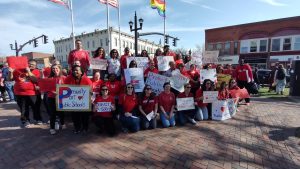Oberlin ACF Actions Polarize Campus
September 30, 2016
This is the first installment in the Review’s new Student Senate column. In an effort to increase communication and transparency, Student Senators will provide personal perspectives on recent events on campus and in the community.
Oberlin College’s student body is never at rest, nor should it be, given the current state of global, national and campus-wide affairs. The event generating the most noise at the beginning of this week was the panel centered on anti-Semitism held by Oberlin Alums for Campus Fairness on Sept. 22. Along with my fellow Student Senators, I took part in sending an open letter to the student body condemning the actions of ACF. Some people may wonder why Senate chose to take this stance, and I would like to address why I participated in sending the condemnation letter.
The most pivotal point that the letter made was the assertion that the Oberlin community should be more responsive to its largest stakeholders: its students. Alumni have a stake in Oberlin’s success, but I believe student concerns deserve priority. The intention to bolster student voices is a positive one. But in reality ACF’s actions — primarily the acts of harassment referenced in Student Senate’s letter, as well as a letter regarding anti-Semitism that ACF published — served to polarize campus and pit students against each other rather than bring them together. It did not result in increased empathy and understanding but rather animosity and distance. I believe the positive emails and reactions we received in response to Senate’s letter reflect that we accurately represented our constituents.
I attended the panel that ACF hosted. While I was thankful for the dialogue stimulated by the College students and Oberlin community members who attended, I found that the panel fell short of being a productive, educational tool. Kenneth Marcus, one of the speakers on the event panel and a former employee of the U.S. federal government, shared a statistic claiming that 54 percent of Jewish college students experience anti-Semitism. Marcus also shared a story about his experience on a college campus asking Jewish students if they had experienced anti-Semitism at school. When hardly any students replied that they had experienced anti-Jewish sentiments, he listed examples of acts that he personally interpreted as anti-Semitic until a sufficient number of students replied that they had experienced those acts.
While I think that discussion around bigotry is important, defining what a student or any person experiences on their behalf is not a positive action. I also believe that the panel’s characterization of anti-Semitism on Oberlin’s campus as “rampant” is ill-fitting. Approximately 15 Jewish students signed Oberlin ACF’s Jan. 5, 2016 letter to the administration regarding anti-Semitism. While this number may neglect some students who were afraid to sign the letter — as Oberlin ACF President Melissa Landa pointed out — it still falls far short of the national average that Marcus provided. Do not get me wrong; even one act of anti-Semitism is one too many. There is no place for racism, anti-Semitism, sexism, anti-queerness or any form of bigotry on this campus. However, characterizing anti-Semitism reported by a minute portion of the Jewish student body as “rampant” and holding a panel on anti-Semitism in response, juxtaposed with the ways Oberlin alumni have responded to allegations of racism from Black students, paints an unsatisfying picture.
Some have addressed Black students’ claims, and others have mocked them or neglected them. I do not mean to imply that the struggles or oppression of any two groups of people should be compared; I merely mean to ask people to think critically about the ways we respond to requests for help from different bodies of people. Now more than ever is a time for everyone — and as a Jew, I call specifically to Jews — to practice empathy and understanding, particularly to people of color nationally and internationally experiencing oppression.
I began this week hearing about the ACF panel, but I ended my week hearing, for the upteenth time, about Black people in the United States being gunned down by police. I would like to extend whatever empathy I can to affected communities and reaffirm that #BlackLivesMatter. I call on Oberlin College and its governing bodies to place themselves on the side of empathy and declare that #BlackLivesMatter.


















